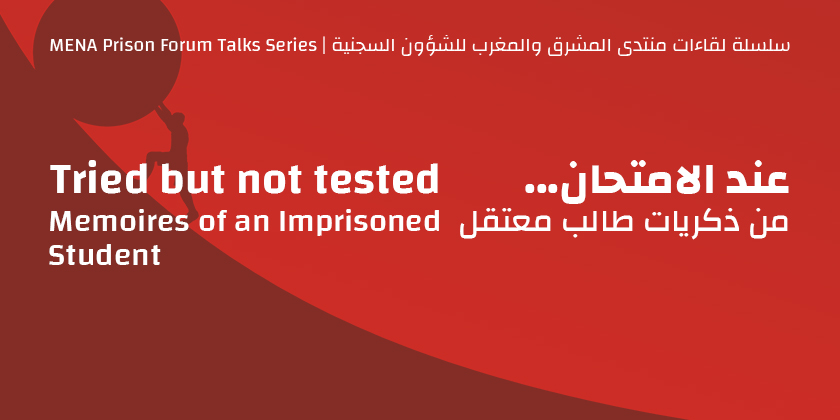
TRIED BUT NOT TESTED
A Conversation with Saif al-Islam Eid
Via Zoom
NOV 4, 2021
On November 4, 2021, the MENA Prison Forum hosted a discussion of its recently published log Tried but not Tested: Memoires of an Imprisoned Student by Egyptian researcher Saif al-Islam Eid. On January 24, 2014, first-year university student Saif al-Islam Eid was arrested at a checkpoint while traveling to the north of Egypt. He was accused of plotting against the public order and locked up as a political prisoner just like thousands, possibly tens of thousands, of other Egyptians. Eid was released about a year later, having endured a traumatic experience inside prison while also being forced to miss his college exams. Eid focuses on his desire to study and sit for his exams, not the physical mistreatment, in the memoir he wrote a few years later about this trying time. Eid's drive in sitting for exams represents the desire of many to further their education and expand their thinking—and the roadblocks the Egyptian regime places in their way.
At the beginning of the talk, MPF Coordinator Mina Ibrahim, highlighted the concerning rise in Egyptian authorities targeting academics and researchers over the last few years. He pointed to the blog post that MPF had previously published when historian Alia Mossallam was briefly detained in July 2021 upon arrival at Cairo Airport. Within this context, Eid mentioned during his talk that there is nothing unusual in his story, as he understands very well that hundreds of individuals, among them university students, have been arrested and taken to prison, and that not all of them had the good fortune to have their case come to trial relatively quickly. Additionally, Eid’s experience with prison is not limited to that period in his life: his father also served a prison sentence as a political prisoner. Against this background, Eid recounts in the pages of his book almost unbelievable travails in prison, due mainly to his determination to be allowed—as he should have been— to take his exams. Eid was first incarcerated in the prison of Ab’adiyya, located in Damanhour, in the north of Egypt, not far from where he was arrested. There he insisted on his right to sit for his exams. Because of his determination, he was punished by the prison authorities and tricked into being transferred to the prison at Fayoum, south of Cairo, where he waited to no avail for an examination committee to come and allow him to take his exams.
This is essentially the plot in Eid’s book. But in what is said, there is much left unsaid: the story Eid tells cannot compete with countless narratives about physical torture experienced in prisons —although he hints several times at having himself undergone physical ill-treatment— he cleverly skips these details, focusing almost exclusively on his predicament of not being able to take his exams, and consequently missing a year of university. He exposes in detail what he considers to be an unwritten government policy behind the massive number of students being arrested and incarcerated who continue to represent the spearhead of Egyptian political activism. In this regard, Eid’s publication draws its strength from its not only interesting but also important content, as the text is a subjective account of the single-minded determination of one student to learn and to pass his exams. Clearly, it stands as a statement against injustice, but it also demonstrates that individual resistance, even in the name of passing exams, is a form of self-defense.
In the same vein, a second interrelated important part of Eid’s talk was his attempt to highlight the different pathways of imprisoned students. Happily, Eid graduated from university in Egypt in June 2018, and afterward chose to leave the country and move to Doha. There he obtained a Masters in Political Science and International Affairs in 2019, and he is currently continuing his research on Islamic political movements and political transition processes in the MENA region. However, Eid also pointed to how physical and psychological torture that members of his generation encountered have led some of them to commit suicide during or after their detention period, or to join radical militant groups following their release. Therefore, even if we accept that conditions in Egyptian prisons are a source of serious horror, we need to be aware of the fact that the conditions are only one part of prison as a human experience: as the prison experience is one that each prisoner lives in their own unique way. And we should note that these differences are present not only when the incarcerated person is in prison, but also importantly, afterwards, assuming that the prison experience does have an afterward. Indeed, these various experiences differ even between inmates who share the same cell, and it is from the availability of these unique experiences and their details that publications like Eid’s should be written.
During the Q&A session, the audience explored how Eid links his student identity to his prison experience. Several questions wondered about how one’s life and career can be influenced by their incarceration. In this regard, while Eid did not ignore how his detention prevented him from fully concentrating on his studies, he stressed that experiencing Egyptian prisons “from the inside” in turn enabled him to further grapple with how public universities in Egypt teach social sciences and humanities. Eid noticed the gap between the subjects he studied at the faculty of Economics and Political Science at Cairo University, on one hand, and the reality of Egyptian society, on the other hand. While struggling to sit for his exams, Eid discovered that the ‘right’ answers he should write down dismissed his repression by Egyptian authorities. Moreover, while pointing to the close relation between faculty members and the state security apparatus, Eid confirmed that his detention enabled him to reflect on his studentship and to re-think his relationship to his educational institution.